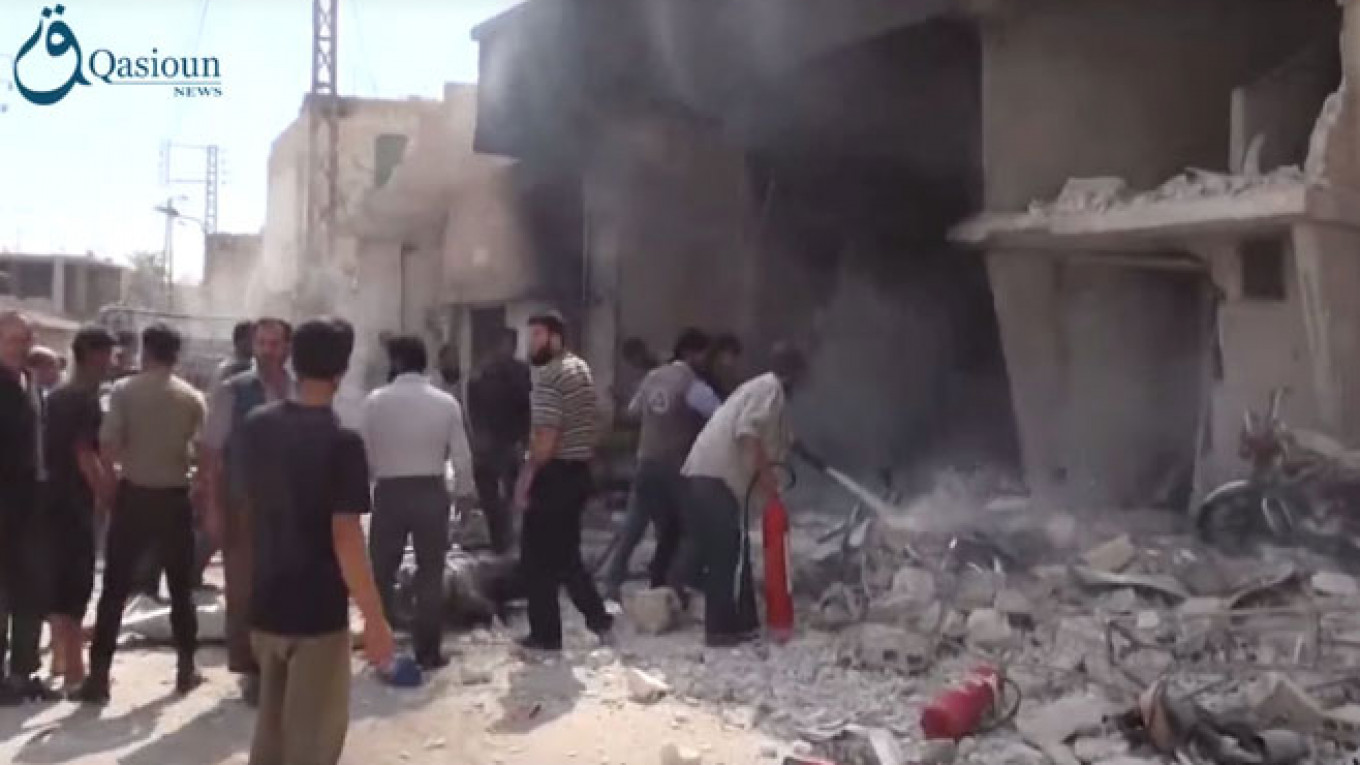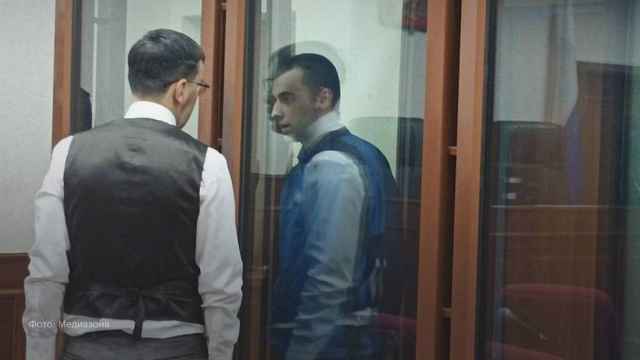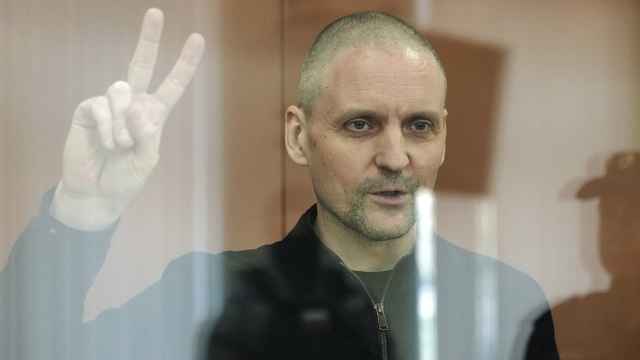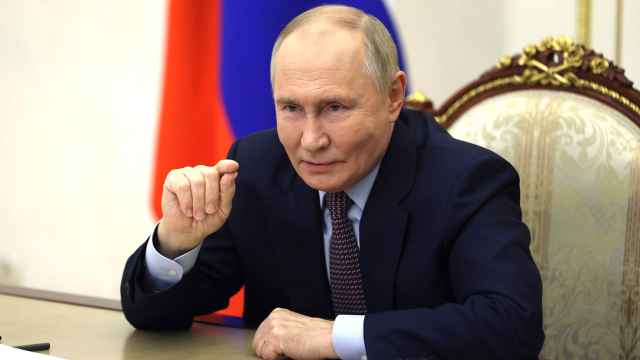Almost as soon as the first reports of Russian air strikes in Syria hit the press, President Vladimir Putin accused the West of launching a new assault in an information war against Russia.
As the warplanes began to attack, Western journalists questioned Moscow's motives, offering evidence that Moscow was striking not only the Islamic State, but other armed groups in Syria fighting Russia's ally, President Bashar Assad. Reports also emerged of civilian deaths in Russian bombing raids.
But on Thursday, a day after the strikes began, Putin waved off what he called "information attacks."
"The first reports of civilian casualties appeared before our planes took off," Putin said, according to the TASS news agency.
His words were quickly picked up by Russian media.
"Russia Laughs Off 'Pseudo-Sensations' About 'Bombed' Civilians in Syria," read a headline on Sputnik International, an English-language news website run by the state-owned Rossiya Segodnya media company. Meanwhile, claims that Russia was targeting anyone but terrorists were refuted.
Russia has state-controlled media to push its message both inside and outside the country. But while there is no doubt that most Russians will readily agree with whatever Putin and these powerful media tell them, analysts said that to convince foreigners would be an uphill battle. The philosophy of Russian propaganda to the outside world has been to attack and undermine Western news organizations and Western leaders, not to deliver Russia's message.
One of the Kremlin's most powerful tools is RT, a state-funded television station that broadcasts in multiple languages and regions. But the channel "has been working according to its main model, which can be described as 'everybody lies and there is no truth,'" said Vasily Gatov, a Russian media analyst and visiting fellow at the USC Annenberg Center on Communication Leadership and Policy in California.
This technique "has not been useful, and is unlikely to be useful in the future," he told The Moscow Times in written comments.
The Kremlin does not have enough resources to convince Western society to believe its narrative, analysts said. Instead, the country's media will maximize efforts to persuade Russians that Putin's intervention in Syria is a necessary "sacred war" — the same scheme that was used during the Ukraine conflict last year.
Western Narrative
Soon after Russian warplanes began flying sorties on Wednesday, Western journalists began to report evidence of civilian deaths and attacks in territory not controlled by the Islamic State, or ISIS.
"The U.S. believes Russia has launched its first air strikes in Syria just hours after the country's parliament approved Vladimir Putin's request for military intervention. … [A]ctivists in Homs and Hama provinces have posted images and video online claiming to show Russian planes bombing groups of non-ISIS rebels who are fighting Bashar al-Assad's forces," British newspaper The Independent reported Wednesday.
"Russian air strike in Syria Targeted CIA-Backed Rebels, U.S. Officials Say," read a headline in The Wall Street Journal, an American newspaper, the same day. "One area hit was [a] location primarily held by rebels receiving funding, arms, [and] training from CIA and allies," said the article's subheading.
The Guardian wrote that "Syrian activists, civilians and rebels asserted that Russian strikes had targeted moderate forces who were opposed to the regime of president Bashar Assad, a Kremlin ally. The president of an opposition group said that at least 36 civilians, including women and children, were killed in strikes in Homs."
CNN, the U.S. news network, said in an article on its website, "An international coalition is urging Russia to immediately cease attacks on the Syrian opposition and civilians and focus instead on fighting the ISIS terrorist group."
Russian Narrative
The Russian propaganda machine responded. State television channels devoted hours of air time to Russian operations in Syria. Pro-Kremlin bloggers and Internet trolls on the payroll of the authorities immediately exposed numerous "lies" by foreign journalists. Even the Defense Ministry posted several videos of air strikes aiming at the right enemy.
Vesti, a state-run television channel, reported: "Several hours after the first Russian planes took off, media began to distribute statements about air strikes hitting civilians and saying the terrorists [hit] were in fact so-called Syrian opposition squads. Russian military officials called these reports 'pseudo-sensations' [that were] prepared in advance."
RT's website published an op-ed column by Neil Clark, a British journalist. "No sooner had Russian planes taken off to bomb ISIS terrorists and their associates in Syria, claims made by the West's anti-Russia lobby started to flood in — only to be repeated in much of the Western mainstream media," Clark wrote. The column concluded that an information war against Russia had been launched.
When asked whether RT had a strategy in this proclaimed information war, the channel's press service said, "RT correspondents are actually on the ground in Damascus and Latakia. Meanwhile, we see Western outlets quoting casualty numbers using videos of alleged Russian strikes while admitting that they cannot establish their veracity."
"Hysterical anti-Russian campaigning is disheartening, but no longer surprising," the press service said in written comments.
No Chance at Convincing the West
There is no coordinated effort to attack Russia in Western media, said Gatov.
Western news organizations may be suspicious of Moscow's actions in Syria, but they do not have "the coordination that Russian media have shown, 'working' the topic as if on command," according to Gatov.
"For the U.S. and some European media, the issue of Syria has been important for a long time, and they follow every event there much more thoroughly than Russian media," he said.
As for the Russian propaganda outlets trying to shift public opinion in the West, Gatov said their influence was too weak to change anything.
"RT's influence on the audience in the English-speaking world is not strong," he said. "Sputnik [International] also has its audience, but it is marginal in terms of its importance and political views."
Research into the global influence of Russia's foreign news services supports Gatov's claims. "According to an investigation carried out by [state-run news agency] RIA Novosti in 2013, the RT television channel … is significantly overstating its popularity and is not worth the money the state assigns to it from the budget (which is around 14 billion [rubles, $212 million] in 2015, according to RT)," Alexei Kovalyov, a former RIA Novosti employee, wrote in his blog on Medium.com, citing an article from the U.S. Daily Beast news website.
The Kremlin simply has no resources powerful enough to persuade the West, agreed Nikolai Svanidze, a prominent journalist and member of the presidential Human Rights Council.
"There's RT, but that's it. RT does quite a thorough job, but it's not enough to successfully advocate [Russia's point of view] in Western countries that have huge numbers of powerful media outlets," he told The Moscow Times in a telephone interview.
Russia's propaganda machine has always been aimed first and foremost at the Russian audience, Svanidze said, and the methods it is now using were designed and tested during the Ukrainian conflict.
"We are fighting for all the good in the world against the U.S., which represents all the bad in the world — that's how an average Russian sees the situation," he said.
But unlike in Ukraine, where Russia acted without support from any other nation, the Kremlin has allies and working relationships in Syria. News reports say Moscow has set up a joint information center with Syria, Iraq and Iran in Baghdad to help coordinate action against the Islamic State, and Russia has established a communications channel with the U.S. to prevent "incidents" between the two countries' warplanes in Syria, according to the BBC.
Dmitry Oreshkin, an independent political analyst, said the Kremlin was playing two sides — trying to decrease international tension and somehow solve the situation quietly by showing the will to collaborate with other governments, but at the same time escalating mass hysteria about the conflict inside Russia.
"It is hard to explain," Oreshkin told The Moscow Times in a phone interview. "The reason is either an ideological division inside the elite, or just a complex game, in which they try to look law abiding and nice to the West, while inside the country cultivating a more brutal image."
A Message from The Moscow Times:
Dear readers,
We are facing unprecedented challenges. Russia's Prosecutor General's Office has designated The Moscow Times as an "undesirable" organization, criminalizing our work and putting our staff at risk of prosecution. This follows our earlier unjust labeling as a "foreign agent."
These actions are direct attempts to silence independent journalism in Russia. The authorities claim our work "discredits the decisions of the Russian leadership." We see things differently: we strive to provide accurate, unbiased reporting on Russia.
We, the journalists of The Moscow Times, refuse to be silenced. But to continue our work, we need your help.
Your support, no matter how small, makes a world of difference. If you can, please support us monthly starting from just $2. It's quick to set up, and every contribution makes a significant impact.
By supporting The Moscow Times, you're defending open, independent journalism in the face of repression. Thank you for standing with us.
Remind me later.






